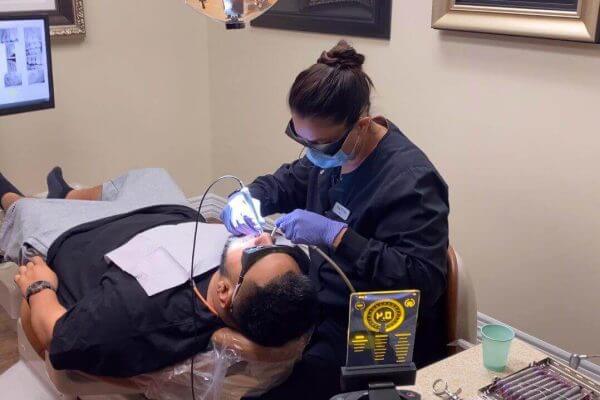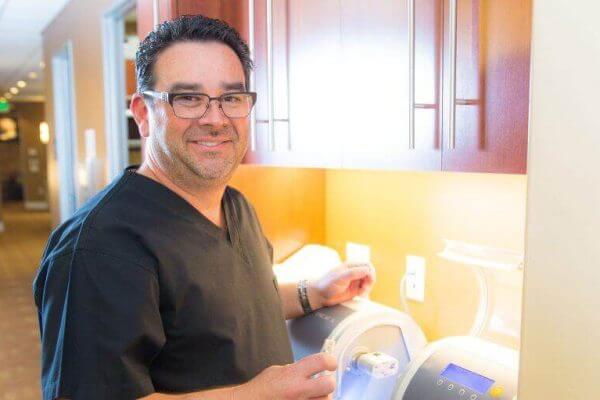Whole-Body Health is Connected to the Mouth
Most people would be surprised to find out the entire body is connected to the mouth through various systems, including the circulatory and immune systems. The health of a person’s mouth can affect the overall health of the body, and vice versa.
For example, poor dental hygiene can lead to gum disease, which has been linked to an increased risk of heart disease and stroke. Certain systemic conditions, such as diabetes and autoimmune disorders can also affect oral health. Oral infections can spread to other parts of the body through the bloodstream, leading to potential complications.
Maintaining good oral hygiene and regularly visiting Dr. Mark Phillipe, DDS, and Dr. Derek Hauser, DDS, at Lakefront Family Dentistry in Lake Elsinore can not only improve the health of your mouth, but it will absolutely benefit the overall health of your body.

Gum Disease and Periodontal Disease
There is a strong connection between whole-body health and oral health. Poor oral hygiene can lead to gum disease and periodontal disease, which can have serious consequences for overall health. Gum disease and periodontal disease are caused by bacteria that build up in the mouth and attack the gums and other supporting structures of the teeth. If left untreated, these conditions can cause the gums to become inflamed and infected, leading to pain, swelling, and bleeding.
In severe cases, gum disease and periodontal disease can cause the gums to pull away from the teeth (receding gums), leading to tooth and bone loss. Additionally, the bacteria that cause these conditions can enter the bloodstream and spread throughout the body, potentially leading to other health problems. For example, gum disease has been linked to an increased risk of heart disease, stroke, and diabetes.
Gum Disease Can Cause Bone Loss and Receding Gums
Gum disease, also known as periodontal disease, is an infection of the gums and the surrounding structures that support the teeth. One of the main causes of gum disease is the buildup of plaque and tartar, which can lead to inflammation of the gums. When the gums become inflamed, they begin to pull away from the teeth, creating pockets of infection. These pockets can become deeper over time, eventually leading to bone loss.
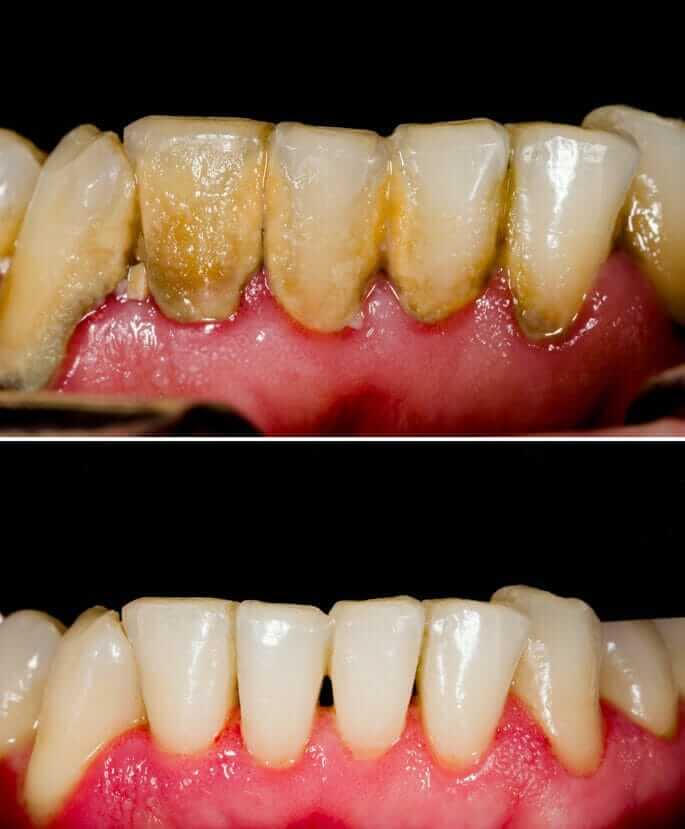
The bacteria that cause gum disease can also release toxins that damage the bone and connective tissue that hold the teeth in place. As the infection spreads and the bone is destroyed, the teeth become loose and may eventually fall out. In addition, the body’s immune response to the infection can also lead to bone loss. The inflammation caused by the infection attracts white blood cells, which can break down bone as they try to fight the infection.
Reasons for Receding Gums and Bone Loss Include:
- Gum disease (Periodontitis): This is a bacterial infection that affects the gums, bone, and connective tissue that hold the teeth in place. It’s caused by plaque and tartar buildup, which leads to inflammation of the gums.
- Genetics: Some people are more prone to receding gums and bone loss due to genetics.
- Trauma: Physical trauma to the mouth, such as from an accident or injury, can cause receding gums and bone loss.
- Brushing too hard: Using a toothbrush with hard bristles or brushing too aggressively can cause abrasion and receding gums.
- Clenching or grinding: Clenching or grinding your teeth can put a lot of pressure on the gums and bone, which can cause receding gums and bone loss over time.
- Hormonal changes: Hormonal changes in the body can cause changes in the gums, making them more susceptible to receding gums and bone loss.
- Tobacco use: Smokers and tobacco users are at a higher risk of developing receding gums and bone loss.
- Illness: Some medical conditions such as diabetes and autoimmune disorder can also increase the risk of receding gums and bone loss.
- Medications: Some medications can cause dry mouth, which can lead to an increased risk of receding gums and bone loss.
- Age: As we age, our gums and bones can weaken, making them more susceptible to receding gums and bone loss.
It is important to maintain good oral hygiene, regular dental checkups and to address any underlying condition that may contribute to receding gums and bone loss.
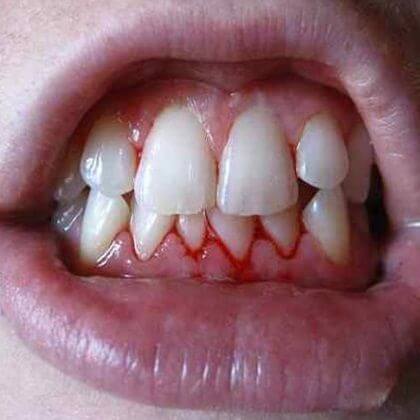
How to Prevent Oral Bone Loss
Here are some tips to help prevent oral bone loss:
- Brush and floss regularly: Brushing your teeth twice a day with a soft-bristled toothbrush and flossing at least once a day can help remove plaque and bacteria from your teeth and gums, which can prevent bone loss.
- Use an antiseptic mouthwash: Rinsing with an antiseptic mouthwash can help kill bacteria and freshen your breath.
- Maintain a healthy diet: A diet rich in calcium and other vitamins and minerals is essential for maintaining strong bones.
- Quit smoking and limit alcohol consumption: Smoking and excessive alcohol consumption can both increase your risk of oral bone loss.
- Regular dental check-ups: Regular dental check-ups are crucial in detecting early signs of oral bone loss, and your dentist can provide appropriate treatment to prevent it from worsening.
- Wear a night guard if you grind or clench your teeth: Grinding or clenching your teeth can put a lot of pressure on the gums and bone, which can cause receding gums and bone loss over time. Wearing a night guard can help protect your teeth and gums.
- Address underlying medical conditions: Some medical conditions such as diabetes, autoimmune disorder, and osteoporosis can also increase the risk of receding gums and bone loss. If you have any of these conditions, it’s important to work closely with your healthcare provider to manage them.
- Be mindful of medication: Some medications can cause dry mouth, which can lead to an increased risk of receding gums and bone loss. If you are on any medication, ask your healthcare provider if it can affect your oral health.
How to Prevent Gum and Periodontal Disease
Brush your teeth twice a day, flossing daily, and using mouthwash to kill bacteria and remove plaque. It is also important to see the Dr. Mark Phillipe, DDS, at Lakefront Family Dentistry twice a year for a professional cleaning and checkup, as this can help detect and treat any problems early on. By taking good care of your oral health, you can help prevent serious health problems and maintain good overall health.
What is Gum Disease?
Gum disease, also known as periodontal disease, is a condition that affects the gums and other supporting structures of the teeth. It is caused by bacteria that build up in the mouth and attack the gums, leading to inflammation and infection. If left untreated, gum disease can cause the gums to pull away from the teeth, leading to tooth loss and other serious health problems.

Have You Ever Felt a Sticky Film of Bacteria on Your Teeth?
Gum disease typically starts with the accumulation of plaque, which is a sticky film of bacteria that accumulates on the teeth. If our registered dental hygienists do not remove it through a professional teeth cleaning or through your regular brushing and flossing, it can harden into tartar, which is much harder to remove and can cause inflammation of the gums. This is known as gingivitis, which is the early stage of gum disease.
Do You Have Swollen Gums and Bad Breath?
Symptoms of gingivitis include red, swollen, and bleeding gums, as well as bad breath. If gingivitis is not treated, it can progress to periodontitis, which is a more advanced stage of gum disease. Symptoms of periodontitis include chronic bad breath, loose teeth, and receding gums. In severe cases, the gums can pull away from the teeth, leading to tooth loss.
Gum disease can be prevented by practicing good oral hygiene, including brushing and flossing regularly, using mouthwash, and seeing the dentist twice a year for a professional cleaning and checkup. If you notice any symptoms of gum disease, it is important to see the dentist as soon as possible to prevent the condition from worsening.

What is Periodontal Disease?
Periodontal disease, also known as gum disease, is a condition that affects the gums and other supporting structures of the teeth. It is caused by bacteria that build up in the mouth and attack the gums, leading to inflammation and infection. If left untreated, periodontal disease can cause the gums to pull away from the teeth, leading to tooth loss and other serious health problems.
Periodontal disease typically starts with the accumulation of plaque, which is a sticky film of bacteria that will form on the teeth. If it is not removed through regular brushing and flossing, it can harden into tartar, which is much harder to remove and can cause inflammation of the gums. This is known as gingivitis, which is the early stage of periodontal disease.
Symptoms of Periodontal Disease
Symptoms of gingivitis include red, swollen, and bleeding gums, as well as bad breath. If gingivitis is not treated, it can progress to periodontitis, which is a more advanced stage of periodontal disease. Symptoms of periodontitis include chronic bad breath, loose teeth, and receding gums. In severe cases, the gums can pull away from the teeth, leading to tooth loss.
Periodontal disease can be prevented by practicing good oral hygiene, including brushing and flossing regularly, using mouthwash, and seeing the dentist twice a year for a professional cleaning and checkup. If you notice any symptoms of periodontal disease, it is important to see the dentist as soon as possible to prevent the condition from worsening.
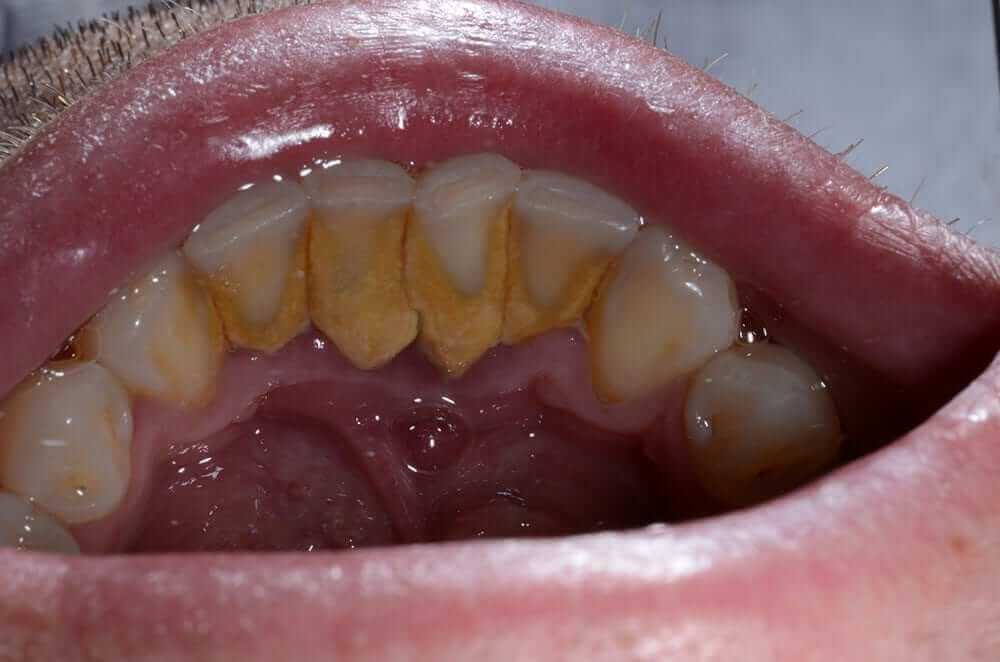
How Often Do You Need to Get a Dental Checkup?
It is generally recommended that adults visit the dentist twice a year for a dental checkup and professional teeth cleaning. This is because regular checkups and cleanings can help prevent problems like tooth decay and gum disease and can also help detect and treat any problems early on.
During a dental checkup, the dentist will examine your teeth, gums, and mouth for any signs of problems. This may include checking for cavities, examining the gums for signs of inflammation or infection, and looking for any other abnormalities. The dentist may also take Panoramic digital x-rays in our office to check for problems that are not visible during a visual exam.
After the checkup, one of our amazing, experienced registered dental hygienists will clean your teeth to remove plaque and tartar, which can cause tooth decay and gum disease. The dental hygienist will use special tools to carefully scrape away any plaque and tartar that has built up on your teeth. They will also polish your teeth and apply fluoride to help protect your teeth from cavities.
Overall, it is important to see the dentist regularly for checkups and cleanings to maintain good oral health. Most dentists recommend visiting the dentist twice a year, but some people may need to visit more often, depending on their individual needs and risk of developing dental problems. It is always best to follow your dentist’s recommendations and schedule regular appointments to keep your teeth and gums healthy.
Contact Lakefront Family Dentistry’s Dental Office at (951) 244-9495 During Business Hours to Schedule an Appointment and Meet with Our Top Dentists, Dr. Mark Phillipe, DDS, and Dr. Hauser, DDS, in our Lake Elsinore Office.


